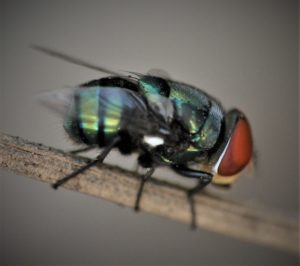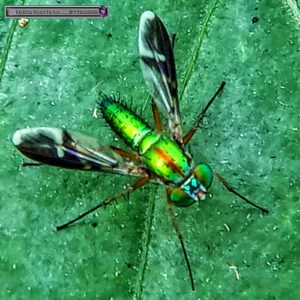WHY SO FLY?

Fly control
Fly control requires skill and experience.
It doesn’t take a rocket scientist to know that summer is off to a wet start. In fact I’ve lost count of the number of time I’ve heard people have said regarding the constant wet weather, “ I’m over it”. However there are some bugs that are extremely happy with these conditions, in fact making hay while the sun shine’s you could say ( forgive the weather pun).
How flies work
You see flies are insects, which are basically “bags of fluid”. Conditions for them to flourish are heat and moisture. Two of the things we have had recently. So outside of homes flies and other bugs are increasing in numbers. People are noticing already, a friend of mine who is immaculately clean, asked why her kitchen had been invaded by flies this year. “Never before” she mentioned curious to find out why flies were numerous this year. I let her know it was the unusual seasonal warm and wet conditions. Unfortunately, there is most likely to be a recoil, as the summer heat finally arrives, the flies and other bugs become more active, and fly or scurry inside homes much to peoples’ annoyance.
Are flies bad?
Is it important keep flies out of your house? Besides being annoying, flies can be vectors for disease transfer. If you have ever seen the horror movie “The Fly” you know that flies consume their food in a rather disgusting way. They spray the contents of their stomach on ( your ) food, which contains their enzymes. These enzymes dissolve the food into a fluid and they start sucking up their meal. During this process they can contaminate food with disease. Also, often their claws are covered in disease too as they land in unclean places outside. They can also lay eggs in food e.g. meat and cause it to be fly blown causing food spoilage. So yes, keeping flies away is a good idea, but the risk of getting sick is low. As they say, worse things have happened at sea.
Fly management
So how do you manage flies? Well lets have look at what happens in the Northern Territories or Alice Spring, where the flies are not only numerous and pesty, but some of them bite! In these areas chemical treatments for homes from pest controllers are the last line of defense! The first line of defense is a barrier. Yes, the good old fashioned fly screen. Fly screen doors and fly screens on the windows. This allows air flow without the flies being able to get in. This reduces the indoor-outdoor flow that kiwis love but is very effective at keeping the flies out.
The second method of using a barrier is to shut all doors and windows and control the temperature of the interior by air conditioning. This is why when you check into a five-star hotel, there are no flies at reception and it’s a comfortable temperature.
The least common way of using a barrier to keep flies out is air doors. These devices sit on top of entrance ways and blow an air current over the access space/doorway. Flies can’t fly through the turbulent air. These are effective but uncommon due to their cost.
The last way you can manage flies is to use chemicals. You can use chemicals in two main ways, vector control or a surface spray.
Vector control in homes commonly involves a small dispensing unit that sprays chemicals into the air at set interval times. This method can be effective at controlling flies that are flying around. The disadvantage is two-fold. Firstly the spray is airborne, and it can get into your eyes and you will inhale the chemicals. Secondly a single unit only works in a small area.
The surface spray is what most pest controllers offer for flies. It involves spraying surfaces that flies land on, that kills them on contact. The advantage of this treatment is that it’s locked into the surfaces (e.g. ceiling) and not available for you to absorb or inhale. The disadvantage is that you need the flies to land on the surface before it works. So, it’s not going to help with flies that fly around and never land. Also, some surfaces cannot be treated, and flies can land on these with impunity e.g., kitchen bench where food is prepared.
Either way chemical treatments should be seen as offering a reduction in flies and not a barrier to stop them flying in.
General suggestions
Other minor changes you can make that may help, but are really common sense are
(i) Reducing flies’ access to food/ food scraps
(ii) Reducing flies’ access to pets’ faeces.
(iii) Keeping composting away from the house
(iv) Setting up air flows inside your home by using fans.
Small flies
Small flies such as Fruit flies and Moth flies are not affected by chemicals or barriers. They breed in drains and/or nutrient rich water. If you have persistent issues with these flies, you need to seek an inspection from a pest controller to ascertain the cause and provide a plan for a solution.
Last word
Finally, I feel sorry for flies as a group of insects. Flies get a bad rap. Flies belong to the group Diptera. Diptera all have two wings and two halteres (small sticks/stubs for balance). The flies you know are only a handful of the 1000s of species of flies. 99% of Diptera never get into a house. There are some cool and very beautiful solitary flies. Also, there are flies that are mimics. Is that really a bee or wasp you are looking at? Take a closer look, it could be a fly. When I see the mimics in customers gardens, I tell them the game is up, I know they are not a bee or wasp. I just hope no one sees me talking to a fly.
By Owen Stobart who has a B.Sc. Entomology from Victoria University and is member of the NPMA.
Owen is a qualified pest controller for ACES pest control
parts of this article are quoted on newshub

